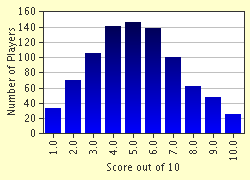Quiz Answer Key and Fun Facts
1. Munich: On September 29, 1938, the Munich agreements surrendering the Sudetenland of Czechoslovakia to Nazi Germany were signed by Germany, the United Kingdom, France and Italy. France had betrayed its pledge to intervene if the sovereignty of Czechoslovakia was threated. The United Kingdom, for its part, was guilty of a grievous moral act of treachery, as there was no question of France taking on the Third Reich without full British support. Between them, Britain and France destroyed the only remaining democracy in Central Europe. Which statesmen actually signed the infamous document for France and the UK ?
2. France-England:
This colourful character from medieval France was accessory in the installment of his Friend King Philippe VI de Valois on the throne in 1328. He betrayed his King by inciting the King of England Edward III to invade France. His actions effectively started the Hundred Years' War. Who was he ?
3. United States of America:
During the American Revolution, who planned to surrender West Point to the British for the sum of 20,000 pounds sterling ?
4. Norway:
This leader of the Nazi party in Norway collaborated with the Nazis during WWII. He was the head of a puppet government despised by the population. This traitor was swiftly executed after the war. Who was he ?
5. France:
This French Revolution General defeated the Austrian invaders at Valmy in 1792, thereby saving the young French Republic. However, he was beaten by the Austrians at Neerwinden in 1793 and defected to them. He then attempted to attack his own country with the help of the Austrian army. Who is he ?
6. France:
This politician rose to power in Vichy France in 1940 after the victory of Germany. He was chief of government of the Franch State, and promoted the collaboration policy with Nazi Germany. After the Liberation, he was sentenced to death and executed. Who is he ?
7. Rome:
In 54 AD, the emperor Claudius was poisoned by his wife. Following this, she managed to have her 17-year old son Nero installed as the new emperor. Who was this treacherous woman ?
8. Germany:
In June 1934, during the "Night of the Long Knives", Hitler liquidated the old para-military branch of the Nazi Party, the SA (Stormtroopers). The leader of the SA, an old companion of Hitler in the Nazi party, was murdered. Who was he ?
9. France:
This Jewish Officer of the French Army was accused and convicted of treason for the Germans in 1894. This event spurred a wave of hysterical antisemitism in France. This officer was then released and exonerated. Who is he ?
10. Ottawa, Canada:
This is still a matter of controversy. In 1982, under the leadership of Pierre Elliott-Trudeau, Canada and its ten provinces signed the Constitution Act. This effectively transferred the power to amend the constitution from the British parliament to Canada. However, the document was drafted and signed by the other provinces during the night, while the delegation of one province was absent (kept aside ?). The next morning, the premier of this province refused to sign the Act. Which province was that?
Source: Author
El_Raton
This quiz was reviewed by FunTrivia editor
bloomsby before going online.
Any errors found in FunTrivia content are routinely corrected through our feedback system.


